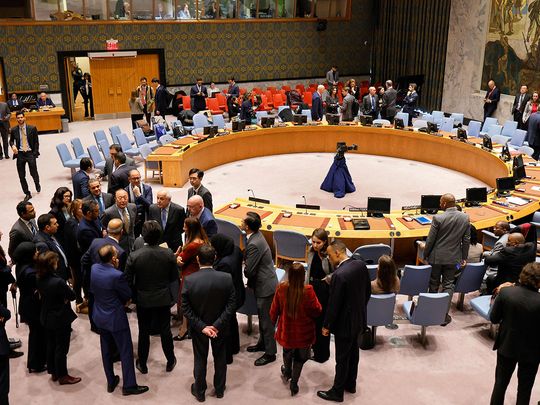
In a diplomatic move fraught with strategic intricacies, the United Nations Security Council successfully navigated a potential US veto to pass a resolution on Friday, amplifying the call for heightened humanitarian assistance to the embattled Gaza Strip.
The culmination of days of delicate negotiations, the resolution underscores the council’s commitment to fostering “safe, unhindered, and expanded humanitarian access” to Gaza while laying the groundwork for the creation of conditions conducive to a sustainable cessation of hostilities.
The resolution, meticulously debated to find common ground among divergent perspectives, represents a notable departure from earlier, more assertive drafts.
Initial versions had unambiguously called for an immediate cessation of the 11-week conflict and sought to curtail Israeli control over aid deliveries, presenting formidable challenges to consensus-building within the council.
In a compromise of sorts, the final text incorporated nuanced language that ultimately garnered the approval of the council, with the United States — traditionally a steadfast ally of Israel — opting for a diplomatic abstention.
Stewardship of the UAE
Crafted under the diplomatic stewardship of the UAE, the resolution on humanitarian aid for the Gaza Strip stands as a testament to the efficacy of extensive consultations and engagement among Security Council members and concerned stakeholders.
Its genesis lies in a comprehensive understanding of the dire humanitarian circumstances unfolding on the ground in Gaza, with a nuanced approach that aims to balance the urgent need for intervention with the intricate geopolitical dynamics surrounding the Israeli-Palestinian conflict.
Humanitarian intervention
This diplomatic triumph is not merely a procedural victory; it represents a multifaceted acknowledgement by the Security Council of the pressing need to address the acute humanitarian crisis in Gaza.
Furthermore, it underscores the delicate balancing act required to navigate the complex web of geopolitical considerations inherent in protracted conflicts, where competing interests and historical tensions often complicate the pursuit of consensus on matters of humanitarian concern.
As the international community grapples with the persistent challenges of conflict resolution and humanitarian intervention, the successful passage of this resolution serves as a poignant reminder of the nuanced diplomacy required to advance collective action in addressing crises that unfold against the backdrop of long-standing geopolitical complexities.





_resources1_16a45059ca3_small.jpg)

